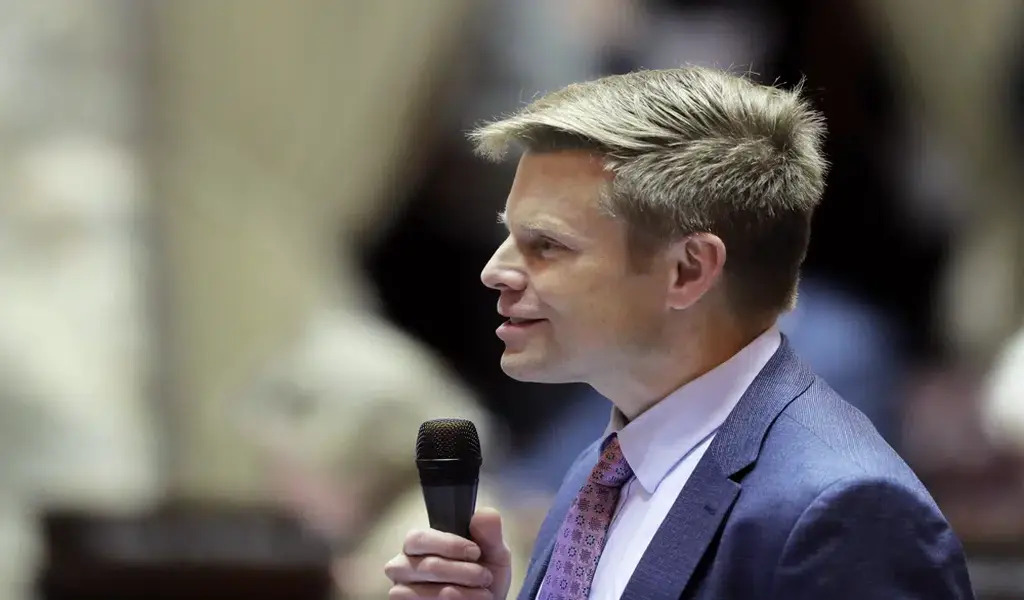News
Bills In Washington, California Allow Transgender People To Seal Name-Change Requests

(CTN NEWS) – WASHINGTON – In many jurisdictions, you can change your name, but you can’t entirely get rid of your previous one. This is especially problematic for transgender individuals, and lawmakers in at least two states are working to change it.
A proposed law in Washington would let gender expression and identity be used as justifications for sealing, or preventing the public from seeing, a future petition for a name change.
Also, a California law would demand that petitions submitted by children to change their name and gender on identification documents be sealed.
Advocates caution that because their prior names, and consequently their lives, are an open book in the public record, transgender people may be vulnerable to cyberbullying or even physical violence in jurisdictions where such petitions are not sealed.
One advocate pointed out that when students are looking for background information on a new kid in town, they can and do quickly obtain and exchange such records.

Assemblymember Chris Ward is accompanied by his partner Thom Harpole, and children Betty and Billy as he is sworn in as Speaker Pro Tempore during the opening session of the California Legislature in Sacramento, Calif., on Dec. 5, 2022.(AP Photo/José Luis Villegas, Pool)
Washington Reported Constant Abuse To Transgender People
Graduate student Maia Xiao from the University of Washington reported receiving constant abuse, including hate mail, after learning that the name-change records of a transgender buddy were posted on an online forum.
She urged reform in a letter to Democratic state senator Jamie Pedersen last summer.
“That feels very close to me,” Xiao added, declining to give her friend’s name out of respect for their privacy.
“I don’t spend a lot of time online, but it’s incredibly unsettling to know that transphobic trolls who want to hurt people may have such easy access to something so intimate.”
The bipartisan Washington legislation, which Pedersen is sponsoring and is anticipated to pass both the House and the Senate, passed the Senate this month.
The bill would also grant records privacy to refugees, emancipated minors, and those who have been granted asylum. It is based on legislation in New York and Oregon.

Maia Xiao poses for a portrait in the library of radio station KEXP where she volunteers in Seattle, Feb. 17, 2023. (AP Photo/Manuel Valdes)
Washington And California Stand In Stark Contrast
Only those who have been the victims of domestic violence are currently able to easily seal name changes in Washington. California is one of the states that grant exceptions to people who have been victims of crimes like stalking, sexual assault, and human trafficking.
This looked like a straightforward measure that could make transgender individuals much safer in our state, according to Pedersen.
Several government representatives and law enforcement agents are concerned that the ideas could allow criminals who ask for a name change to avoid being held accountable.
The Washington bill would still ban sex offenders and those who are incarcerated from requesting a sealed name change, but it would allow courts to open a name change file if law enforcement had good cause.
According to Jennifer Wallace, executive director of the Washington Association of County Officials, “this is not the objective of the bill, and such occurrences would be unusual, but there need to be protocols in place to prevent it.”
The strategies in Washington and California stand in stark contrast to recent, enigmatic efforts in Florida and Texas to collect lists of trans residents using public records, as well as to the avalanche of anti-trans legislation being considered by politicians in at least 39 states.

Texas Department Of Public Safety Discovered Over 16,000 Changes In Gender
The urgency of his suggestion is increased by Republicans’ “disturbing” requests for information on transgender individuals in certain of those states, according to Pedersen.
Last year, the office of Texas Attorney General Ken Paxton requested statistics on the number of persons who had updated their driver’s licenses to reflect a different gender.
The Texas Department of Public Safety discovered over 16,000 changes in gender over the previous two years but withheld the information because it was unable to pinpoint the causes of each shift.
Last month, Florida Governor Ron DeSantis requested information on students who had sought or received therapy for gender dysphoria from state universities. Neither Paxton nor DeSantis gave an explanation for their request for the information.
Advocates claim that young trans people who have mental health problems or gender dysphoria are more vulnerable to harassment as a result of such revelations.
The same online community that Xiao claimed had targeted her friend came under fire last year for incidents of “doxxing” trans persons, or intentionally posting their personal information online, and has been connected to suicides.

Maia Xiao works in a production room at radio station KEXP where she volunteers in Seattle, Feb. 17, 2023. (AP Photo/Manuel Valdes)
State Of California To Seal Any Petition Under 18 Years Of Age
Peers are able to look up and discuss court documents pertaining to students’ applications for name and gender changes as they transfer to different middle or high schools, according to Kathie Moehlig, executive director of the San Diego charity TransFamily Support Services.
Once kids she counsels alerted her to the practice, she approached California Assembly Speaker Pro Tem Chris Ward with the idea for the measure.
According to Moehlig, many families with trans children aren’t even aware that such documents are available to the public.
She asserted that a person’s gender identification is an intimate aspect of who they are. “They ought to be able to keep their identities private.”
The state of California would have to seal any petition submitted by a person under the age of 18 for a chance to gender and sex or to gender, sex, and name on identification documents, according to a measure that was proposed there last month.
But has not yet been scheduled for a hearing. Documents from a petitioner’s court case would also be sealed.
Clarice Barrelet, a San Diego attorney, claims that typing her transgender kid’s name into a search engine will instantly reveal his legal gender transition. Her son is 11 years old.

Sen. Jamie Pedersen, D-Seattle, speaks on the Senate floor in Olympia, Wash., Jan. 30, 2019.(AP Photo/Ted S. Warren, File)
By the time he was 6, he maintained that he should not be considered a girl and that he would become a man, according to Barrelet.
Even before his mother filed a court petition to have the formal changes to his identity documents made, he came out as transgender at the age of eight and changed the name and the pronouns he used at school.
Barrelet stated that in order to better protect both children’s and adults’ privacy, she believes that the data should be sealed.
Ward, a Democrat from San Diego County and vice chair of the California Legislative LGBTQ Caucus, expressed his hope that his bill would lessen the likelihood of bullying for youngsters who identify as gender non-conforming.
He mentioned that young people who are still coming to terms with their identities may find being out to be particularly upsetting.
Ward stated, “I want them to be at ease and free to be who they are.”
RELATED CTN NEWS:
Turkey Begins Investigation Into 612 People After Devastating Earthquake

News
Google’s Search Dominance Is Unwinding, But Still Accounting 48% Search Revenue

Google is so closely associated with its key product that its name is a verb that signifies “search.” However, Google’s dominance in that sector is dwindling.
According to eMarketer, Google will lose control of the US search industry for the first time in decades next year.
Google will remain the dominant search player, accounting for 48% of American search advertising revenue. And, remarkably, Google is still increasing its sales in the field, despite being the dominating player in search since the early days of the George W. Bush administration. However, Amazon is growing at a quicker rate.
Google’s Search Dominance Is Unwinding
Amazon will hold over a quarter of US search ad dollars next year, rising to 27% by 2026, while Google will fall even more, according to eMarketer.
The Wall Street Journal was first to report on the forecast.
Lest you think you’ll have to switch to Bing or Yahoo, this isn’t the end of Google or anything really near.
Google is the fourth-most valued public firm in the world. Its market worth is $2.1 trillion, trailing just Apple, Microsoft, and the AI chip darling Nvidia. It also maintains its dominance in other industries, such as display advertisements, where it dominates alongside Facebook’s parent firm Meta, and video ads on YouTube.
To put those “other” firms in context, each is worth more than Delta Air Lines’ total market value. So, yeah, Google is not going anywhere.
Nonetheless, Google faces numerous dangers to its operations, particularly from antitrust regulators.
On Monday, a federal judge in San Francisco ruled that Google must open up its Google Play Store to competitors, dealing a significant blow to the firm in its long-running battle with Fortnite creator Epic Games. Google announced that it would appeal the verdict.
In August, a federal judge ruled that Google has an illegal monopoly on search. That verdict could lead to the dissolution of the company’s search operation. Another antitrust lawsuit filed last month accuses Google of abusing its dominance in the online advertising business.
Meanwhile, European regulators have compelled Google to follow tough new standards, which have resulted in multiple $1 billion-plus fines.

Pixa Bay
Google’s Search Dominance Is Unwinding
On top of that, the marketplace is becoming more difficult on its own.
TikTok, the fastest-growing social network, is expanding into the search market. And Amazon has accomplished something few other digital titans have done to date: it has established a habit.
When you want to buy anything, you usually go to Amazon, not Google. Amazon then buys adverts to push companies’ products to the top of your search results, increasing sales and earning Amazon a greater portion of the revenue. According to eMarketer, it is expected to generate $27.8 billion in search revenue in the United States next year, trailing only Google’s $62.9 billion total.
And then there’s AI, the technology that (supposedly) will change everything.
Why search in stilted language for “kendall jenner why bad bunny breakup” or “police moving violation driver rights no stop sign” when you can just ask OpenAI’s ChatGPT, “What’s going on with Kendall Jenner and Bad Bunny?” in “I need help fighting a moving violation involving a stop sign that wasn’t visible.” Google is working on exactly this technology with its Gemini product, but its success is far from guaranteed, especially with Apple collaborating with OpenAI and other businesses rapidly joining the market.
A Google spokeswoman referred to a blog post from last week in which the company unveiled ads in its AI overviews (the AI-generated text that appears at the top of search results). It’s Google’s way of expressing its ability to profit on a changing marketplace while retaining its business, even as its consumers steadily transition to ask-and-answer AI and away from search.

Google has long used a single catchphrase to defend itself against opponents who claim it is a monopoly abusing its power: competition is only a click away. Until recently, that seemed comically obtuse. Really? We are going to switch to Bing? Or Duck Duck Go? Give me a break.
But today, it feels more like reality.
Google is in no danger of disappearing. However, every highly dominating company faces some type of reckoning over time. GE, a Dow mainstay for more than a century, was broken up last year and is now a shell of its previous dominance. Sears declared bankruptcy in 2022 and is virtually out of business. US Steel, long the foundation of American manufacturing, is attempting to sell itself to a Japanese corporation.
SOURCE | CNN
News
2024 | Supreme Court Won’t Hear Appeal From Elon Musk’s X Platform Over Warrant In Trump Case

Washington — Trump Media, The Supreme Court announced Monday that it will not hear an appeal from social media platform X about a search warrant acquired by prosecutors in the election meddling case against former President Donald Trump.
The justices did not explain their rationale, and there were no recorded dissents.
The firm, which was known as Twitter before being purchased by billionaire Elon Musk, claims a nondisclosure order that prevented it from informing Trump about the warrant obtained by special counsel Jack Smith’s team violated its First Amendment rights.
The business also claims Trump should have had an opportunity to exercise executive privilege. If not reined in, the government may employ similar tactics to intercept additional privileged communications, their lawyers contended.
Supreme Court Won’t Hear Appeal From Elon Musk’s X Platform Over Warrant In Trump Case
Two neutral electronic privacy groups also joined in, urging the high court to hear the case on First Amendment grounds.
Prosecutors, however, claim that the corporation never shown that Trump utilized the account for official purposes, therefore executive privilege is not a problem. A lower court also determined that informing Trump could have compromised the current probe.

Trump utilized his Twitter account in the weeks preceding up to his supporters’ attack on the Capitol on January 6, 2021, to spread false assertions about the election, which prosecutors claim were intended to create doubt in the democratic process.
The indictment describes how Trump used his Twitter account to encourage his followers to travel to Washington on Jan. 6, pressuring Vice President Mike Pence to reject the certification, and falsely claiming that the Capitol crowd, which battered police officers and destroyed glass, was peaceful.
Supreme Court Won’t Hear Appeal From Elon Musk’s X Platform Over Warrant In Trump Case
That case is now moving forward following the Supreme Court’s verdict in July, which granted Trump full immunity from criminal prosecution as a former president.
The warrant arrived at Twitter amid quick changes implemented by Musk, who bought the company in 2022 and has since cut off most of its workforce, including those dedicated to combating disinformation and hate speech.
SOURCE | AP
News
The Supreme Court Turns Down Biden’s Government Appeal in a Texas Emergency Abortion Matter.

(VOR News) – A ruling that prohibits emergency abortions that contravene the Supreme Court law in the state of Texas, which has one of the most stringent abortion restrictions in the country, has been upheld by the Supreme Court of the United States. The United States Supreme Court upheld this decision.
The justices did not provide any specifics regarding the underlying reasons for their decision to uphold an order from a lower court that declared hospitals cannot be legally obligated to administer abortions if doing so would violate the law in the state of Texas.
Institutions are not required to perform abortions, as stipulated in the decree. The common populace did not investigate any opposing viewpoints. The decision was made just weeks before a presidential election that brought abortion to the forefront of the political agenda.
This decision follows the 2022 Supreme Court ruling that ended abortion nationwide.
In response to a request from the administration of Vice President Joe Biden to overturn the lower court’s decision, the justices expressed their disapproval.
The government contends that hospitals are obligated to perform abortions in compliance with federal legislation when the health or life of an expectant patient is in an exceedingly precarious condition.
This is the case in regions where the procedure is prohibited. The difficulty hospitals in Texas and other states are experiencing in determining whether or not routine care could be in violation of stringent state laws that prohibit abortion has resulted in an increase in the number of complaints concerning pregnant women who are experiencing medical distress being turned away from emergency rooms.
The administration cited the Supreme Court’s ruling in a case that bore a striking resemblance to the one that was presented to it in Idaho at the beginning of the year. The justices took a limited decision in that case to allow the continuation of emergency abortions without interruption while a lawsuit was still being heard.
In contrast, Texas has been a vocal proponent of the injunction’s continued enforcement. Texas has argued that its circumstances are distinct from those of Idaho, as the state does have an exemption for situations that pose a significant hazard to the health of an expectant patient.
According to the state, the discrepancy is the result of this exemption. The state of Idaho had a provision that safeguarded a woman’s life when the issue was first broached; however, it did not include protection for her health.
Certified medical practitioners are not obligated to wait until a woman’s life is in imminent peril before they are legally permitted to perform an abortion, as determined by the state supreme court.
The state of Texas highlighted this to the Supreme Court.
Nevertheless, medical professionals have criticized the Texas statute as being perilously ambiguous, and a medical board has declined to provide a list of all the disorders that are eligible for an exception. Furthermore, the statute has been criticized for its hazardous ambiguity.
For an extended period, termination of pregnancies has been a standard procedure in medical treatment for individuals who have been experiencing significant issues. It is implemented in this manner to prevent catastrophic outcomes, such as sepsis, organ failure, and other severe scenarios.
Nevertheless, medical professionals and hospitals in Texas and other states with strict abortion laws have noted that it is uncertain whether or not these terminations could be in violation of abortion prohibitions that include the possibility of a prison sentence. This is the case in regions where abortion prohibitions are exceedingly restrictive.
Following the Supreme Court’s decision to overturn Roe v. Wade, which resulted in restrictions on the rights of women to have abortions in several Republican-ruled states, the Texas case was revisited in 2022.
As per the orders that were disclosed by the administration of Vice President Joe Biden, hospitals are still required to provide abortions in cases that are classified as dire emergency.
As stipulated in a piece of health care legislation, the majority of hospitals are obligated to provide medical assistance to patients who are experiencing medical distress. This is in accordance with the law.
The state of Texas maintained that hospitals should not be obligated to provide abortions throughout the litigation, as doing so would violate the state’s constitutional prohibition on abortions. In its January judgment, the 5th United States Circuit Court of Appeals concurred with the state and acknowledged that the administration had exceeded its authority.
SOURCE: AP
SEE ALSO:
Could Last-Minute Surprises Derail Kamala Harris’ Campaign? “Nostradamus” Explains the US Poll.
-

 News4 years ago
News4 years agoLet’s Know About Ultra High Net Worth Individual
-
Entertainment3 years ago
Mabelle Prior: The Voice of Hope, Resilience, and Diversity Inspiring Generations
-
News11 years ago
Enviromental Groups Tell Mekong Leaders Lao Dam Evaluation Process Flawed
-

 Health4 years ago
Health4 years agoHow Much Ivermectin Should You Take?
-

 Tech3 years ago
Tech3 years agoTop Forex Brokers of 2023: Reviews and Analysis for Successful Trading
-

 Lifestyles3 years ago
Lifestyles3 years agoAries Soulmate Signs
-

 Entertainment3 years ago
Entertainment3 years agoWhat Should I Do If Disney Plus Keeps Logging Me Out of TV?
-

 Health4 years ago
Health4 years agoCan I Buy Ivermectin Without A Prescription in the USA?


